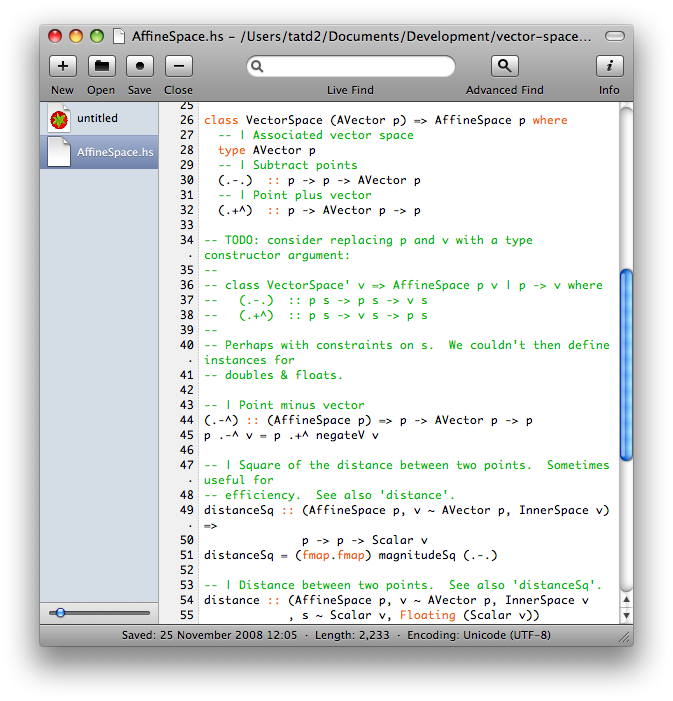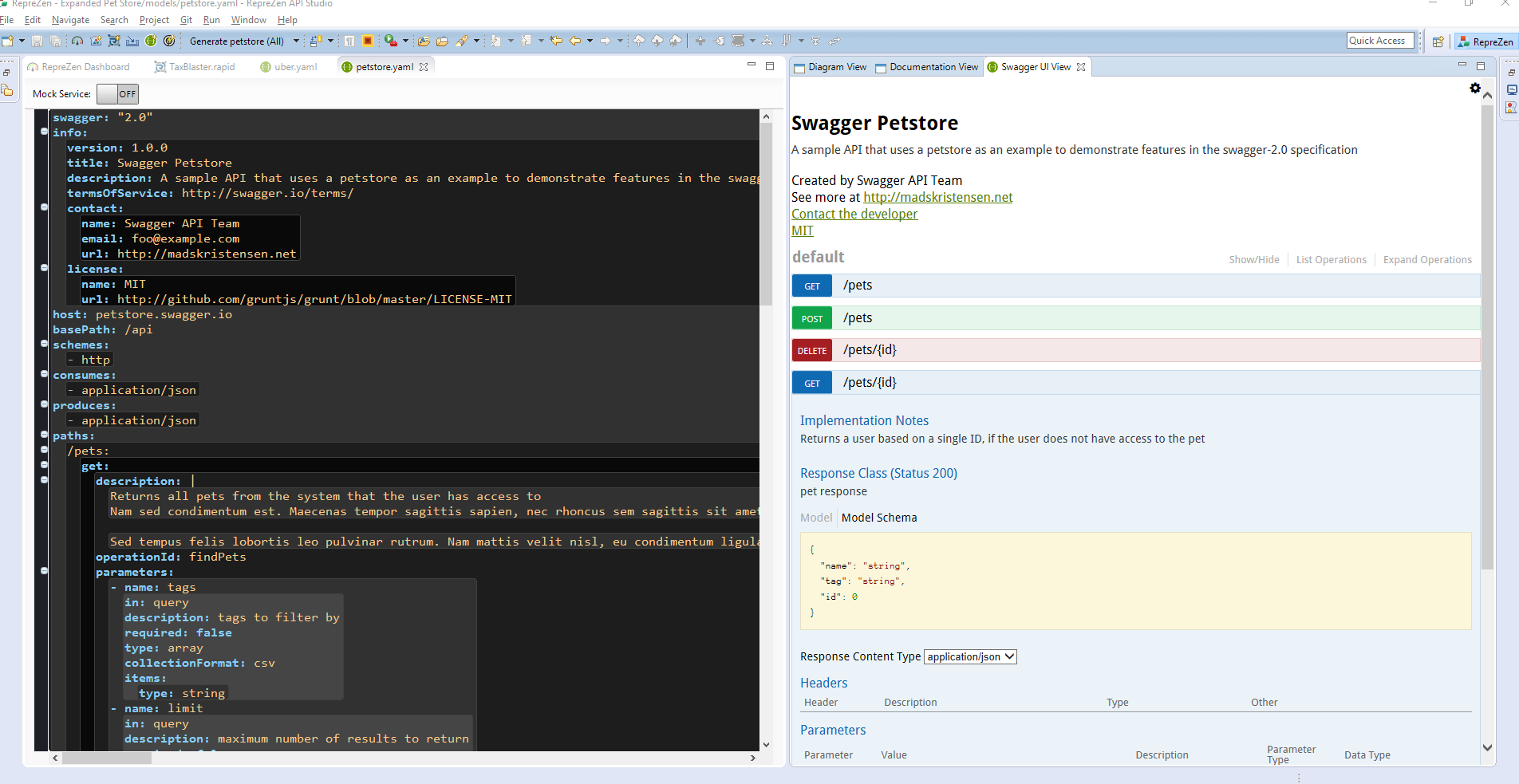I'm trying to get EclipseFP running on my Mac (OSX 10.10.3) using Java 1.7.075 on the currently latest release of Eclipse (Luna, fully upgraded). The install of EclipseFP seems to succeed (no error messages), and i can change the perspective to 'Haskell' without apparent errors, but when i do 'New Haskell Project' an error popup tells me An error occurred while automatically activating bundle net.sf.eclipsefp.haskell.ui (856). Digging deeper into the Eclipse log (see below) the root cause seems to be a java.lang.NullPointerException in net.sf.eclipsefp.haskell.ui.internal.backend.BackendManager.getToolSandbox(BackendManager.java:1108) The Haskell installation on the OS-level was done using brew and is GHC 7.10.1. Any help greatly appreciated!
Closed as off-topic by, Aug 30 '15 at 14:28 This question appears to be off-topic. The users who voted to close gave this specific reason:. 'Questions asking us to recommend or find a book, tool, software library, tutorial or other off-site resource are off-topic for Stack Overflow as they tend to attract opinionated answers and spam. Instead, and what has been done so far to solve it.' – rakeb.mazharul, Jayan, Mark Rotteveel, Skatox, TheCodeArtist If this question can be reworded to fit the rules in the, please.
However, in the case of Eclipse, I find it can be very slow and even crash occasionally, but that is not a case against IDEs in general. I use both Eclipse, VS and Emacs regularly. I would use TextMate too, but I don't have a mac anymore. It depends on what I am doing, more specifically, what system best supports my language and tools. How to make a haskell module using EclipseFP? Browse other questions tagged eclipse haskell eclipse-fp or ask. Installation of EclipseFP on Eclipse Luna (Mac.
I would advocate on the Mac for Java, mosly because I had a very good experience. I'm not going to bang on about its merits as an IDE, but here are some unexpected advantages I found:. When my employer switched IDE's to Eclipse I was way ahead. Pretty much any language I fancied trying out had a free IDE somewhere as an Eclipse plug-in, so I have a very consistent multi-language development environment. When I eventually went over to the Windows dark side I could use the same development environment, which was a huge relief. But this is a bit of a religious topic, so expect to get a whole bunch of different opinions.
Just to be sure you give them fair consideration, Eclipse and Netbeans have gone back and forth for a while. Eclipse used to be a good deal quicker because they didn't use Swing. Now Netbeans has caught up (perhaps surpassed) and has a lot of momentum. You will get more votes for Eclipse. This is because it was better and more people use it-and it's just human nature to feel what you are using is the best and everyone should use it. Because it was better does not mean it's better now.
Netbeans has more languages supported and more all-around support-so it's growing faster. Currently I use Eclipse-I've used both (and IntelliJ and TextMate and Notepad.) and I can tell you that Eclipse has exactly one feature over netbeans. Mylyn (it's been renamed, it used to be called Mylar). This thing is pretty damn cool, but few people seem to even know it exists. So, if you don't know a bunch of keystrokes that already tie you to an editor, the up and coming is Netbeans-don't pass it up because of a bunch of Eclipse votes. Better yet, get good with both-it can't hurt and makes me a lot more comfortable when a company requires one or another.
Don't whine when they make you change. I used both Eclipse and Netbeans.
I like Netbeans more than Eclipse. From java editor point of view, both have excellent context sensitive help and the usual goodies. Eclipse sucks when it comes to setting up projects that other team members can open and use. We have a big project (around 600K lines of code) organized in many folders. Eclipse won't let you include source code that is outside the project root folder. Everything has to be below the project root folder. Usually you want to have individual projects and be able to establish dependencies among them.
Once it builds, you would check them into your source control. The problem with eclipse is that a project (i.e.classpath file) dependencies are saved in user's workspace folder. If you care to see this folder, you will find many files that read like org.eclipse.
etc. What it means is that you can't put those files in your source control.
We have 20 step instruction sheet for someone to go through each time they start a fresh checkout from source control. We ended up not using its default project management stuff (i.e. Classpath file etc). Rather we came up with an Ant build file and launch it from inside Eclipse.

That is kludgy way. If you had to jump through these many hoops, the IDE basically failed. I bet eclipse project management was designed by guys who never used an IDE. Many IDES let you have different configurations to run your code (Release, Debug, Release with JDK 1.5 etc).
And they let you save those things as part of your project file. Everyone in the team can use them without a big learning curve. You can create configurations in Eclipe, but you can't save them as part of your project file (i.e it won't go into your source control).

I work on half dozen fresh checkouts in a span of 6 months. I get tired to recreate them with each fresh checkout. On the other hand, Netbeans works as expected. It doesn't have this project management nightmare. I heard good things about IntelliJ. If you are starting fresh, go with Netbeans.
It depends what you want to do. My experience with Java on the Mac is about a year old by now, but NetBeans had a much better out-of-the-box support for Tomcat (in particular) deployment, and generally seemed to be a little more user friendly. For instance, the Netbeans beta I tried out used forms for web.xml configuration, in comparison to Eclipse's plain ol' XML editor (and in Europa, at least, the XML editor's row redrawing was a little sketchy on the Mac). That said, for that project, I wound up doing a bit of configuration (for a was a n00b) in NetBeans, then moved the XML config files over to Eclipse, and developed the rest there. As others have mentioned, the zillions of plugins are great, and in general the experience is just very consistent. Especially if you have to work on another platform.
If Eclipse had better OS X bindings (does it have any? I'm unaware), I would use that for Obj-C development, as well. I have tested editors for Java extensively and prefer Netbeans to Eclipse by a significant margin. NetBeans has excellent support for Java, a very beautiful user interface and powerful features. It also has excellent support for C and I would choose for this it over, say, Visual Studio.
Consider JCreator classic edition, an excellent place to start although not as powerful as NetBeans, easier to get into at first. I'd also defend NetBeans plugins against Eclipse because although Eclipse is highly praised for the flexibility it is afforded by plugins I think this is largely down to the fact that the also very powerful plugins features of NetBeans are not shouted about so much, even though it is also very strong in this area. I have seen computational fluid dynamics applications based on the NetBeans platform, very impressive, I just don't think NetBeans developers make such a big deal over it because it's already a complete package from the moment you download it, powerful without any need for configuration with plugins. I happen to use Eclipse on my Mac (actually EasyEclipse which comes preconfigured with the most important plugins) and I must say it runs great. I have a less positive experience on Linux though. I have also used NetBeans 6 recently and I was very impressed.
It seems to have more functionality build-in. Most of the functionality is undoubtedly also available as an Eclipse plugin though, if you can find it. Currently I have the impression that if you start developing Swing, Netbeans is your best option. Otherwise, Netbeans or Eclipse with a handy set of plugins are both excellent options. If you do check out eclipse, give a thought to EasyEclipse (free) or perhaps even MyEclipse (not free).
They come with the most usefull plugins preinstalled. I've worked with both Eclipse CDT and NetBeans's C support, and I must say that in my experience CDT is far superior in both stability and in features.
Eclipse Vs Haskell For Machines
It's really impressive how well the CDT indexer works; the tooling is almost as good as Java's. I'm also a huge fan of JDT when compared with NetBeans for Java development. The workflow is just so much smoother, if only due to the incremental compiler (compile-on-save). One thing about NetBeans though, its UI does flow a little better in the 'Mac style', which is ironic seeing as SWT was created to provide a more native interface. The next release of Eclipse should be based on Cocoa (rather than Carbon, which is the current), but that won't be until next June.
Haskell For Mac
Final note: the whole 'in box' vs 'plugins' issue is entirely moot and it has been since Eclipse Calisto (two years ago). Now, with P2 (the new update manager), it's dead easy to get different features in the IDE. I can start with a download and get a fully-functional JDT/CDT/Mylyn environment up and running within five minutes of installation (assuming a reliable internet connection).